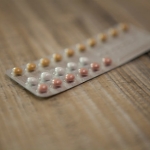If a woman does not breastfeed following delivery, prolactin levels decrease and fertility returns to normal, and pregnancy is possible. Even if a woman decides to breastfeed, she should still use some form of contraception, as prolactin levels vary depending on individual breastfeeding styles. Women may be fertile and become pregnant even before the resumption of their menstrual cycles.
Researchers have found that using the combined oral contraceptive pill (OCP), which contains estrogen and progestin, can increase the risk for venous thromboembolism (VTE), or blood clots. This risk is further increased in women who have a past history of or predisposition to blood clots. The thrombotic changes that take place during pregnancy and delivery (such as an increase in clotting factors and blood volume during pregnancy, and vascular damage during delivery) increase the risk for VTE four-fold. Venous thromboembolic events, including stroke and pulmonary emboli, account for 10% of all maternal deaths.
To decrease the risk of VTE in the postpartum period, it is typically recommended that women avoid using combination OCPs as their contraceptive method. Postpartum women are encouraged to talk to their obstetricians about whether they are good candidates for alternative contraceptive options, which include:
- The progestin-only contraceptive (the “mini-pill”), which does not contain estrogen
- Barrier methods such as condoms, female condoms, diaphragms, etc.
- Intrauterine devices (IUDs) made of copper or progestin that are inserted into the uterus, which have an effect on sperm and the uterine lining
Women with an increased risk for VTE may also consider preventative treatment; anticoagulants may be given prophylactically for the first six weeks postpartum, and can also be used as treatment if a blood clot is reported.
Katherine Donovan, BA
ACOG Practice Bulletin. Use of Hormonal Contraception in Women with Coexisting Medical Conditions. Obstet Gynecol 2006 Jun;107(6):1453-72.
Blickstein D, Blickstein I. Oral contraception and thrombophilia. Curr Opin Obstet Gynecol 2007; 19(4):370-6.
Hume AL, Hijab JC. Oral contraceptives in the immediate postpartum period. J Fam Pract 1991; 32(4):423-5.
James AH. Prevention and management of venous thromboembolism in pregnancy. Am J Med. 2007 ; 120(10 Suppl 2): S26-34.
James AH, Tapson VF, Goldhaber SZ. Thrombosis during pregnancy and the postpartum period. Am J Obstet Gynecol 2005; 193(1):216-9.








Was really interesting information. THK
@Healthy Woman,
hi,
thanks for the research you are doing, it’s realy helping us